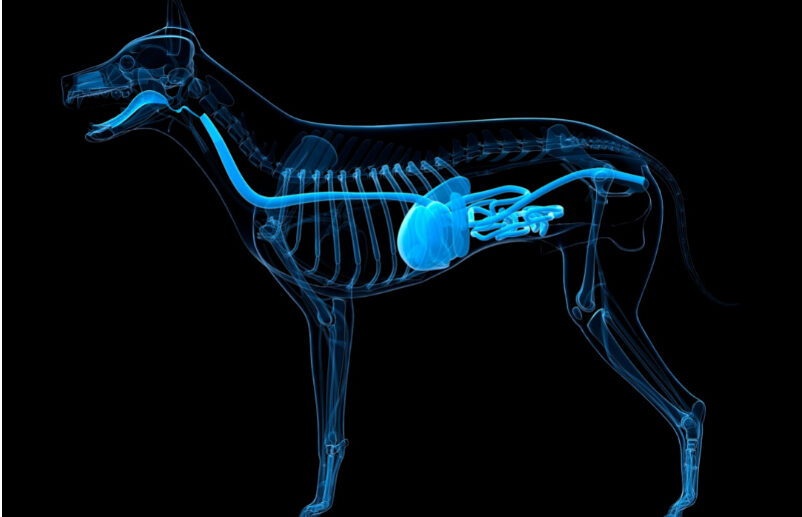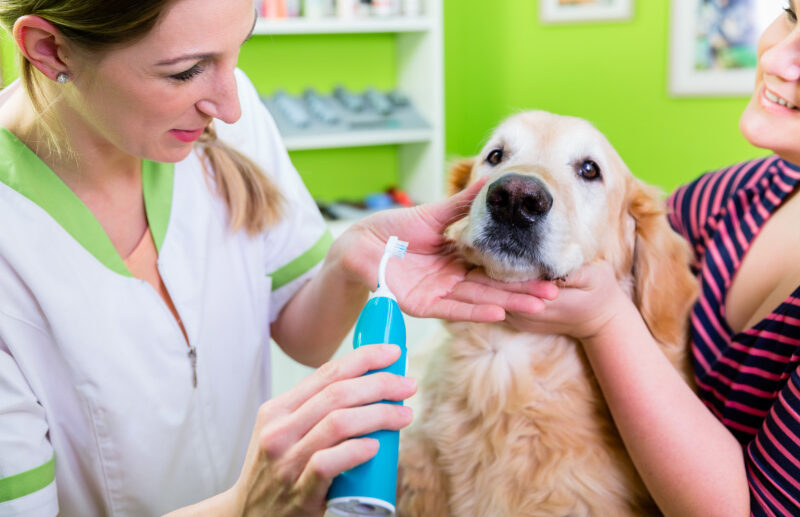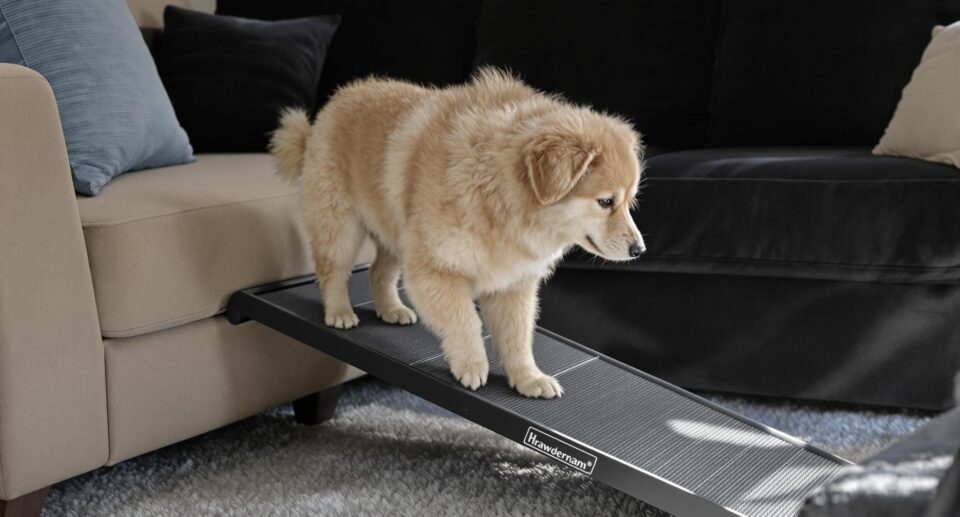Digestive Problems and Concerns in Dogs

Digestive problems are fairly common in pets. Symptoms of pet digestive problems may include changes in appetite, changes in stool quality or quantity, regurgitation, and vomiting. With chronic disease, weight loss may also occur. Digestive problems in pets may be acute, as seen with gastrointestinal parasites, viral infections, dietary indiscretion, or hypersensitivity. Sudden dietary changes may also precipitate digestive problems in pets. Metabolic causes including inflammation of the liver, pancreas, and kidneys also may cause acute and /or chronic digestive issues. Gas distention may occur with foreign body ingestion, as well as gastric dilitation/volvulus syndrome seen in large deep-chested dogs. Depending on the severity and length of the digestive upset, medical examinations will vary, and may include a stool analysis for intestinal parasites, blood work, and X-rays. Treatment of digestive problems may be symptomatic to enhance appetite and reduce diarrhea and/or vomiting, or more specific.
If your pet’s digestive problems continue for more than 24-48 hours or if symptoms intensify, it is important to get prompt veterinary attention. Pets with severe or prolonged diarrhea, vomiting, or bloating may develop severe dehydration, bacterial infections, pancreatitis, and other organ complications. Anemia and shock may develop if excessive blood is lost in the stool or vomit. A veterinary evaluation, hospitalization, and intravenous or subcutaneous fluid therapy are important in order to prevent secondary health issues.
Vomiting and diarrhea
Two of the most common symptoms in pets with digestive upset are vomiting and/or diarrhea. Vomiting pets are assessed for the duration as well as severity of the problem. Based on your pet’s history, your veterinarian will distinguish vomiting from regurgitation, as both of these have different causes and treatments. Physical examination is important to assess the presence of fever, dehydration, and abdominal or stomach pain. A rectal exam is also done to determine your pet’s stool quality and the presence of any foreign material ingested. In male dogs, a rectal exam is also important to evaluate the health of the prostate gland. The time of vomiting relative to eating, and the presence of bile, stomach fluid, or blood is important to determine where in the intestinal tract and stomach the problem is occurring. If your pet has diarrhea, your veterinarian will document any increased urgency, frequency, or accidents in the home, and any history of blood and/or mucous in your pet’s stool. This information is critical in differentiating small intestinal diarrhea versus large intestinal diarrhea, which have different causes and treatments. Your pet’s vaccination history is also important since many intestinal viruses cause vomiting and diarrhea, especially in puppies and kittens.
Depending on the initial diagnostic examinations, medications to decrease your pet’s nausea and vomiting may be used, including Famotidine, Cerenia, and Metoclopramide. Antibiotics including Metronidazole and Tylan Powder may also be prescribed in acute and chronic diarrhea cases. The short-term use of Kaopectate for acute diarrhea and oral pepcid/famotidine for acute vomiting is also recommended. Natural supplements including the slippery elm herb, Fast Balance-G.I., and NaturVet Digestive Enzymes Plus Probiotic are often useful. The herbal product Fidomucil from Animal Apothocary is an excellent product for acute and chronic digestive upset. In most cases of acute diarrhea and/or vomiting, it is necessary to withhold food for 12-24 hours until digestive tract inflammation subsides. Bland, low-fat, easily digestable diets should be used for a few days before transitioning your pet back to his or her normal diet. While there are many veterinary prescription diet options available, feeding your pet bland, home-cooked lean hamburger or lean chicken and rice home diets are often just as effective. Lamb or turkey baby food is particularly helpful in small breeds of dogs and cats. In cases of colitis where there is blood and/or mucous in the stool, lean white meat turkey and sweet potato diets are preferable. For pets with chronic vomiting and/or diarrhea due to suspected food allergies or hypersensitivity, feeding a commercial protein diet made from lamb, duck, rabbit, or venison is helpful in lessening digestive tract flare-ups.
Constipation
Constipation occurs in some pets and has many possible causes. The frequency and difficulty of your pet’s bowel movements need to be evaluated. Causes of pet dehydration include foreign body ingestion and/or hair; dehydration, metabolic diseases of the liver or kidney, cancer, and food allergies. Older dogs and cats may have lower spinal disease which can result in constipation. Lifestyle factors including stress and inadequate exercise should also be evaluated in constipated pets. Treatment of constipation in pets will depend on the underlying causes, but often increasing your pet’s fiber intake through dietary manipulation or supplements, such as Omega 3 fatty acids, can be beneficial. Psyllium husks (seeds), wheat or oat bran, as well as mineral or olive oil may help relieve pet constipation. Products such as Vetasyl and Fast Balance-G.I. are often given to help constipated pets. Correcting dehydration either orally or with the use of subcutanaeous or intraveneous fluids is essential for some pets.
Bloating
Bloating or gas distention occurs in some pets. Causes include foreign body ingestion, and indigestion from feeding a poor quality, carbohydrate-rich diet. Among the offending dietary allergens are soy, corn, wheat, and dairy. Your pet’s bloating may be relieved by feeding a more easily digestible diet, including probiotics and enzymes to help restore digestive function. In many large breed, deep-chested dogs, a condition known as gastric dilitation volvulus or bloat may occur. Symptoms include stomach distention, excessive drooling, panting, retching, ineffectual vomiting, as well as pacing and restlessness. Many of these pets may go into circulatory shock, and develop severe secondary infections and heart arhythmias as the stomach distends and sometimes twists. These are considered medical and possibly surgical emergencies, since affected pets can die if the gas distention and/or twisting is not relieved. While it is not known exactly what causes bloat in dogs, cutting down on processed carbohydrate-rich diets, as well as limiting water intake and exercise after eating is important. Surgical tacking of the stomach is increasingly done as a preventative measure in many large breed dogs, especially at the time of neutering or spaying in puppies.





